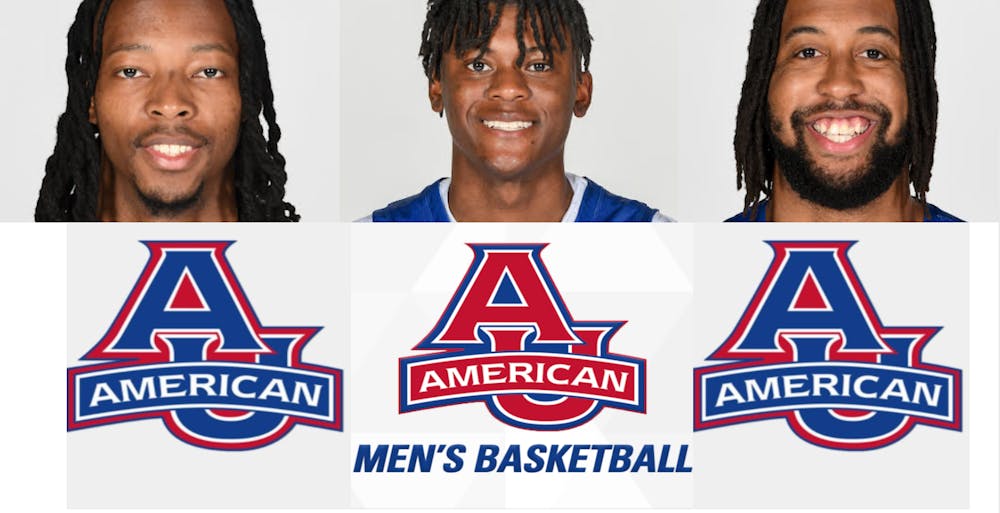As American University’s Black community has grown there has been a large influx of Black men on the campus which has increased traction and motive to create insular and positive organizations and environments for Black men and athletes on campus to congregate and join in brotherhood. The strong sense of Blackness and commradie from freshmen Elijah Stephens [elijahstephens_], graduate students Marvin Bragg Jr. [messymarvv], and Stacky Beckton Jr. [4ep_beck] displays the pride, self-awareness, and rich experiences towards highlighting the embodiment of a Black man’s experience in America and at a PWI, such as American University. The conversations that underline the importance of Black men solidarity is an opportunity to deconstruct and break down the immobility that has been dealt to Black men which disable moments for vulnerability, fluidity, and education that pertain to Black men’s health, prioritization, and individuality instead of a commodity. Conversations such as these are even more important for Black men in spaces where Black men are the minority within the minority as an athlete, student, and man. In remembrance of Black History Month and commemoration of Fredrick Douglas’s 127th birthday on February 20th, 2022, the Sports section of The BlackPrint wanted to highlight the voices, thoughts, opinions, and individuality of the Black men on the American University Men’s Basketball team.
When it comes to being a Black athlete on AU’s campus there is a mix of emotions that come with the territory. On the one hand it brings a multitude of challenges, but even still there are advantages as well. Many Black students at AU often speak to the difficulties of finding a community in which they feel they belong, being that the students make up a small percentage of the campus population. Building a community is imperative in creating a support system and a sense of belonging while away from home. Coming into college through an athletics program, for Stacy, Marvin, and Elijah has been beneficial on this front. Namely, when asked about one of the benefits of being a Black athlete at AU Marvin spoke to the strong friendships he has been able to build while being on the team. On the subject he felt he “wouldn’t have that if I wasn’t on the basketball team”. As a grad student, Marvin has seen AU athletics through its many stages throughout the years, and has the perspective to understand the significance of it. Along with forming strong friendships with their black peers, being a black athlete gave them access to spaces where they can share their feelings. The athletes spoke of the AU Black athlete coalition, which provides them with “a space where we are not just athletes but black men” (Stacy Beckton). These players recognize the lack of identity black students often have on AU’s campus and in being an athlete have benefited from peer support at a level not always shared amongst their peers.
While having a sense of belonging as Black athletes has been comforting in their college careers, outside of the athletics department, the players shared some of the challenges they faced as Black AU students. Although the gym and locker rooms feel like safe spaces to show their blackness, the same couldn’t always be said for the rest of campus life. Stacy and Marvin both shared a sense of initial discomfort upon coming to AU and muting aspects of their identity. Stacy discussed how he felt as though he couldn’t speak on a successful level with that of his peers, due to the difference in dialects. This caused him to often take a back seat with discussions in class, and it wasn’t until his junior year that he truly opened up. This sentiment is all too familiar for many black students at AU unfamiliar with conversing in predominantly white spaces. There is a level of adjustment or “code switching” that many black students feel they must adopt in order to be accepted in collegiate spaces. For some students this feeling causes them to turn away from speaking up in instances where they usually would. It’s important to deconstruct this notion that black students are not valuable as they are, and that their thoughts deserve to be heard no matter the manner in which they may be articulated.
For Marvin, he shared the sentiments of Stacy but feels as though he often misjudged his peers. In other words, he felt as though he would be judged by others if he was his true self, but came to realize that this was often not the case. On the subject he noted, “don’t judge a person based on their opinions”. AU students are notoriously opinionated, which can often be intimidating but Marvin has found that in having “difficult conversations” early on he has been able to feel comfortable as a Black student on campus. Many Black students deal with this feeling of pre-judgment or feeling as though they’re not welcomed in a space even if they are. This stems from the societal standards that often exclude behaviors or sentiments often associated with Blackness.
The combination of the internal and external self acceptance is imperative for Black students to have in predominantly white spaces. This requires a level of self confidence that many don’t have at the age of 18, and as a result leaves many Black students doubting themselves early on in their college careers. The complexities of being a Black athlete lay within the layers of disadvantages and privileges. Though, for Stacy, Marvin, and Elijah they’ve seen both sides of the spectrum and voice their experiences and voice as an amplifier for many Black athletes across America that attend PWIs. The voices, thoughts, and opinions of these three athletes continue to stipulate the ability and individuality of Black athletes outside of the historical boxes that are casted to depict and define them.



